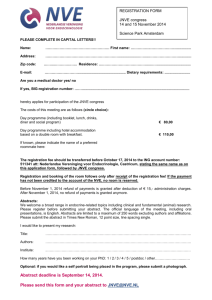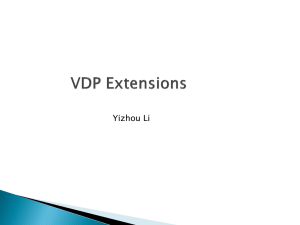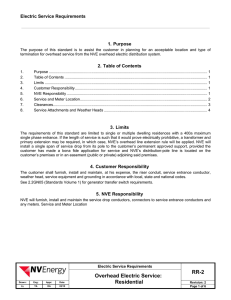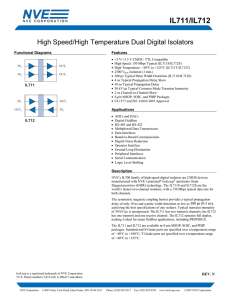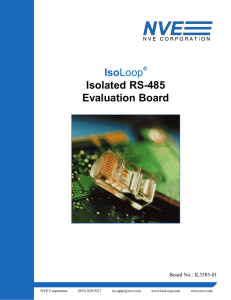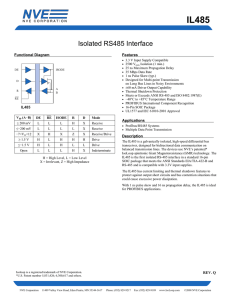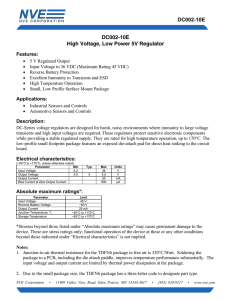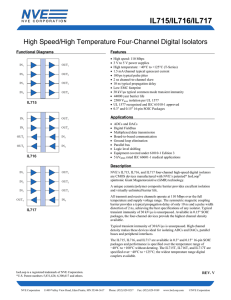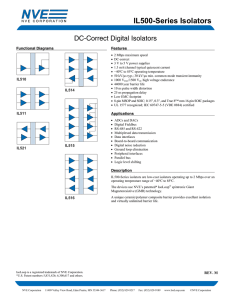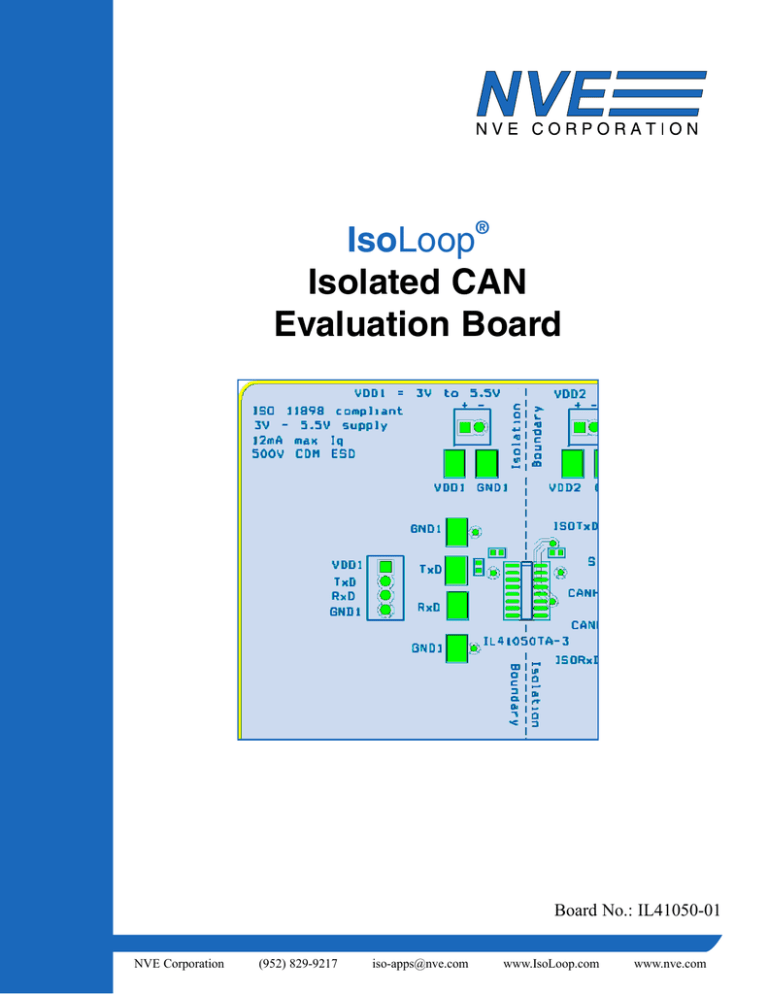
®
IsoLoop
Isolated CAN
Evaluation Board
Board No.: IL41050-01
NVE Corporation
(952) 829-9217
iso-apps@nve.com
www.IsoLoop.com
www.nve.com
About This Evaluation Board
This Evaluation Board provides a complete isolated CAN node using the revolutionary
IL41050TA-3E isolated transceiver.
The IL41050TA is a galvanically isolated, CAN (Controller Area Network) transceiver,
designed as the interface between the CAN protocol controller and the physical bus.
Advanced features facilitate reliable bus operation. Unpowered nodes do not disturb the bus,
and a unique non-volatile programmable power-up feature prevents unstable nodes. The
devices also have a hardware-selectable silent mode that disables the transmitter.
Designed for harsh CAN and DeviceNet environments, IL41050TA transceivers have transmit
data dominant time-out, bus pin transient protection, a rugged Charged Device Model ESD
rating, thermal shutdown protection, and short-circuit protection. Unique edge-triggered
inputs improve noise performance.
Unlike optocouplers or other isolation technologies, IsoLoop isolators have virtually indefinite
barrier life.
The Isolation Advantage
Battery fire caused by over or under charging of individual lithium ion cells is a major concern
in multi-cell high voltage electric and hybrid vehicle batteries. To combat this, each cell is
monitored for current flow, cell voltage, and in some advanced batteries, magnetic
susceptibility. The IL41050 allows seamless connection of the monitoring electronics of every
cell to a common CAN bus by electrically isolating inputs from outputs, effectively isolating
each cell from all other cells. Cell status is then monitored via the CAN controller in the
Battery Management System (BMS).
Another major advantage of isolation is the tremendous increase in noise immunity it affords
the CAN node, even if the power source is a battery. Inductive drives and inverters can
produce large transients. Traditional, non-isolated CAN nodes provide some protection due to
differential signaling and symmetrical driver/receiver pairs, but the IL41050 typically provides
several times more transient immunity than traditional CAN nodes.
NVE Corporation
(952) 829-9217
iso-apps@nve.com
www.IsoLoop.com
www.nve.com
Circuit Diagram
VDD2
VDD1
C DD1
100nF
1
R TXD
Isolation
Boundary
C DD2
100nF
11
16
14
13
12
16K
TxD
RxD
3
10
9
IL41050
TA-3E
pin
1
2
3
4
5
6
7
8
9
10
11
12
13
14
15
16
Symbol
VDD1
GND1
TxD
RxD
NC
NC
NC
NC
IsoRxD
CANL
VDD2
CANH
S
IsoTxD
GND2
VDD2
S
RL
120R
4
GND1
IsoTxD
2
15
IL41050TA-3E
CANH
CANL
IsoRxD
GND2
Description
VDD1 power supply
VDD1 power supply ground return
Transmit Data input
Receive Data output
No internal connection
No internal connection
No internal connection
No internal connection
Isolated RxD output (for test purposes only)
Low level CANbus line
VDD2 CAN I/O bus circuitry power supply input*
High level CANbus line
Mode select input (open or low for normal operation; high for silent mode)
Isolated TxD output (for test purposes only)
VDD2 power supply ground return
VDD2 isolation power supply input*
*Pin 11 is not internally connected to pin 16; both are connected to VDD2 in the PCA.
NVE Corporation
(952) 829-9217
iso-apps@nve.com
www.IsoLoop.com
www.nve.com
Application Information
Bus-Side Power Supply Pins
Both VDD2 power supply inputs (pins 11 and 16) must be connected to the bus-side power
supply. Pin 11 powers the bus side of the CAN I/O circuitry, while pin 16 powers the bus-side
isolation circuitry. For testing purposes, they are not internally connected, but the part will not
operate without both pins powered, and operation without both pins powered can cause
damage.
Power Supply Decoupling
Both VDD1 and VDD2 must be bypassed with 100 nF ceramic capacitors. These supply the
dynamic current required for the isolator switching and should be placed as close as possible
to VDD and their respective ground return pins.
Input Configurations
The TxD input should not be left open as the state will be indeterminate. If connected to an
open-drain or open collector output, a pull-up resistor (typically 16 kΩ) should be connected
from the input to VDD1. This kit has a 16 kΩ pull-up resistor.
The Mode Select (“S”) input has a 150 kΩ nominal internal pull-down resistor. It can be left
open or set low for normal operation.
Bus Termination
Because of their relatively low speed, CAN networks can sometimes be unterminated, but
reflections are minimized by terminating both ends of the bus (but not every node). Two 120 Ω
termination resistors are generally used to match a 60 Ω cable impedance. This kit comes with
a 120 Ω termination resistor. The resistor can be removed for multi-node configurations.
Level Shifting
As shown in the figure at
right, the IL41050 can
provide isolation and level
shifting between a 5 volt
CAN bus and a 3 volt
microcontroller such as an
SJA1000 MCU.
VDD2 = 5V
VDD1 = 3.3V
C DD1
C DD2
100 nF
100 nF
ADR 0...7, CS
XTAL1
SJA1000
Tx0
TxD
CANH
Rx0
RxD
CANL
IsoRxD / IsoTxD Outputs
The IsoRxD and IsoTxD outputs are isolated versions of the RxD and TxD signals. These
outputs are provided on the IL41050 narrow-body version for troubleshooting, and are brought
to test points in this kit. Normally no connections are made to the pins.
Dominant Mode Time-out and Failsafe Receiver Functions
CAN bus latch up is prevented by an integrated Dominant mode timeout function. If the TxD
pin is forced permanently low by hardware or software application failure, the time-out returns
the RxD output to the high state no more than 765 μs after TxD is asserted dominant. The
timer is triggered by a negative edge on TxD. If the duration of the low is longer than the
internal timer value, the transmitter is disabled, driving the bus to the recessive state. The timer
is reset by a positive edge on pin TxD.
If VDD2 power is lost, the IL41050 asserts the RxD output high when the supply voltage falls
below 3.8 V. RxD will return to normal operation when VDD2 rises above approximately 4.2 V.
Programmable Power-Up
A unique non-volatile programmable power-up feature prevents unstable nodes. A state that
needs to be present at node power up can be programmed at the last power down. For example
if a CAN node is required to “pulse” dominant at power up, TxD can be sent low by the
controller immediately prior to power down. When power is resumed, the node will
immediately go dominant allowing self-check code in the microcontroller to verify node
operation. If desired, the node can also power up silently by presetting the TxD line high at
power down. At the next power on, the IL41050 will remain silent, awaiting a dominant state
from the bus.
The microcontroller can check that the CAN node powered down correctly before applying
power at the next “power on” request. If the node powered down as intended, RxD will be set
high and stored in the IL41050’s non-volatile memory. The level stored in the RxD bit can be
read before isolated node power is enabled, avoiding possible CAN bus disruption due to an
unstable node.
XTAL2
IL41050
GND1
NVE Corporation
(952) 829-9217
iso-apps@nve.com
www.IsoLoop.com
GND2
www.nve.com
NVE Corporation
(952) 829-9217
iso-apps@nve.com
www.IsoLoop.com
www.nve.com
Specification Highlights and Quickstart
IL41050TA Specification Highlights:
• Fully compliant with the ISO 11898 CAN standard
• 3.0 V to 5.5 V input power supplies
• 12 mA maximum quiescent recessive supply current
• 70 mA maximum bus-side dynamic supply current
• 1200 VRMS 1 minute isolation (QSOP); 2500 VRMS for narrow and wide SOIC versions
• ±500 V CDM ESD
• 1 Mbps
• 50 kV/μs transient immunity
• Silent mode to disable transmitter
• Unpowered nodes do not disturb the bus
• Edge triggered, non-volatile input improves noise performance
• Thermal shutdown protection
• Short-circuit protection for ground and bus power
• −55°C to +125°C operating temperature
• QSOP, 0.15" SOIC, or 0.3" True 8™ mm 16-pin packages
• UL 1577 recognized; IEC 60747-5-5 (VDE 0884) certified
Quick Start:
• Connect VDD1 to a 3.3 V power supply and VDD2 to 5 V.
• Connect a 500 kHz signal generator to the “TxD” input.
• Verify the “RxD” and CAN outputs on an oscilloscope:
TxD
RxD
CANH
CANL
Visit www.IsoLoop.com for datasheets.
NVE Corporation
(952) 829-9217
iso-apps@nve.com
www.IsoLoop.com
www.nve.com
Evaluation Board Layout
100 nF decoupling
capacitors close to
VDD1 and VDD2 pins
Power supply
connections
ISO 11898 compliant
3V - 5.5V supply
12mA max Iq
Narrow-body package
16kΩ
TxD pull-up
resistor
CANbus
connections
Input
connections
IL41050-06
IL41050TA-3E
narrow-body isolated
CAN transceiver
NVE Corporation
(952) 829-9217
120Ω bus
termination resistor
iso-apps@nve.com
www.IsoLoop.com
www.nve.com
Limited Warranty and Liability
Information in this document is believed to be accurate and reliable. However, NVE does not give any
representations or warranties, expressed or implied, as to the accuracy or completeness of such information
and shall have no liability for the consequences of use of such information. In no event shall NVE be liable for
any indirect, incidental, punitive, special or consequential damages (including, without limitation, lost profits,
lost savings, business interruption, costs related to the removal or replacement of any products or rework
charges) whether or not such damages are based on tort (including negligence), warranty, breach of contract or
any other legal theory.
Right to Make Changes
NVE reserves the right to make changes to information published in this document including, without
limitation, specifications and product descriptions at any time and without notice.
Use in Life-Critical or Safety-Critical Applications
Unless NVE and a customer explicitly agree otherwise in writing, NVE products are not designed, authorized
or warranted to be suitable for use in life support, life-critical or safety-critical devices or equipment. NVE
accepts no liability for inclusion or use of NVE products in such applications and such inclusion or use is at
the customer’s own risk. Should the customer use NVE products for such application whether authorized by
NVE or not, the customer shall indemnify and hold NVE harmless against all claims and damages.
Applications
Applications described in this document are illustrative only. NVE makes no representation or warranty that
such applications will be suitable for the specified use without further testing or modification. Customers are
responsible for the design and operation of their applications and products using NVE products, and NVE
accepts no liability for any assistance with applications or customer product design. It is customer’s sole
responsibility to determine whether the NVE product is suitable and fit for the customer’s applications and
products planned, as well as for the planned application and use of customer’s third party customers.
Customers should provide appropriate design and operating safeguards to minimize the risks associated with
their applications and products. NVE does not accept any liability related to any default, damage, costs or
problem which is based on any weakness or default in the customer’s applications or products, or the
application or use by customer’s third party customers. The customer is responsible for all necessary testing
for the customer’s applications and products using NVE products in order to avoid a default of the
applications and the products or of the application or use by customer’s third party customers. NVE accepts no
liability in this respect.
An ISO 9001 Certified Company
NVE Corporation
11409 Valley View Road
Eden Prairie, MN 55344-3617
©NVE Corporation
All rights are reserved. Reproduction in whole or in part is prohibited without the prior written consent of the
copyright owner.
Manual No.: ISB-CB-007
June 2014
NVE Corporation
(952) 829-9217
iso-apps@nve.com
www.IsoLoop.com
www.nve.com

